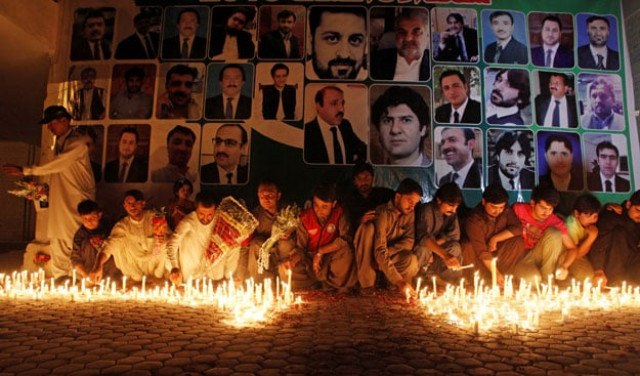"None is left": Legal community decimated by Quetta bombing
At least 74 people were killed, most of them lawyers, in country’s worst bombing this year

Residents light candles for lawyers killed during the Monday blast at Civil Hospital during a candle light vigil in Quetta, August 9, 2016. PHOTO: REUTERS
He lost some 60 colleagues in the suicide bombing that decimated the leadership of this tight-knit legal fraternity, probably for years.
"The cream of our legal fraternity has been martyred," Lango told Reuters at the house of the slain bar president. "Our senior leaders ... are now gone."
Pakistan has endured a wave of militant attacks in recent years, but lawyers have not been singled out on such a scale before.
The Quetta carnage was forewarned
That changed on Monday when a suicide bomber struck a crowd of lawyers who had crammed into a hospital emergency department to accompany the body of Bilal Anwar Kasi, president of the 3,000-member Balochistan Bar Association.
 Residents pray for lawyers killed during the Monday blast at Civil Hospital during a candle light vigil in Quetta, August 9, 2016. PHOTO: REUTERS
Residents pray for lawyers killed during the Monday blast at Civil Hospital during a candle light vigil in Quetta, August 9, 2016. PHOTO: REUTERSAt least 74 people were killed, most of them lawyers, in country’s worst bombing this year, claimed by both a faction of the Pakistani Taliban, Jamaat-ur-Ahrar, and the Middle East-based Islamic State.
Across Quetta, lawyers gathered for funeral prayers on Wednesday, visited families of lost friends, shouted slogans at protests and urged the government to protect them better.
Sombre Quetta buries its dead
Balochistan is no stranger to violence, with separatist fighters launching regular attacks on security forces for nearly a decade and the military striking back. Militants, particularly sectarian groups, have also launched a campaign of suicide bombings and assassinations of minority Shias.
After Monday's attack, the legal community in Balochistan and across the country said it felt leaderless but also vowed unity.
Kasi's younger brother, Shoaib Kasi, himself an attorney, said the attacker had "pre-planned" to first kill the bar association president and then target the hospital, knowing that mourners would gather there. "It will take centuries for us to make up this loss," lawyer Abdul Aziz Lehri told Reuters at the district court building, largely deserted due to a strike by his colleagues.
In pictures: Aftermath of Quetta suicide attack
The president of the Supreme Court Bar Association, Ali Zafar, called the attack a "turning point", and gave the government until Thursday to present a security plan to protect lawyers and other "soft targets".
Anger and defiance
Emotions ran high at a press conference where lawyers expressed anger, particularly against the country's powerful military, but also voiced defiance. "We are not tense because of the terrorists," said senior lawyer Manzoorul Hassan. "We have sadness, of course, but no fear."
Lawyers have held a special place in country's democratic process. A lawyers' movement emerged as the vanguard of a campaign against the then army chief Pervez Musharraf after he suspended the country's top judge in 2007 for opposing plans to extend the general's term in office.
Lawyers organised convoys travelling from city to city to support ousted chief justice Iftikhar Chaudhry, and the government was forced to re-instate him. Musharraf emerged from the confrontation a much diminished figured and stepped down as president in 2008. "Lawyers were the targets, because we fight for the rights of the people," Ali Zafar told the press conference. "They think we will be weakened ... I say we will become stronger."
Prominent lawyer Ali Ahmed Kurd said those left would carry the torch.
"The juniors who are left, they are filled with the passion for working hard, for honesty ... that will make up the difference," Kurd told Reuters in Quetta. But he added that the lawyers of Balochistan were afraid to call a meeting of the bar association to map out the legal fraternity's next steps.
"If you convene a meeting now, who will come?" Kurd said. "There's no one. None is left."



















COMMENTS
Comments are moderated and generally will be posted if they are on-topic and not abusive.
For more information, please see our Comments FAQ